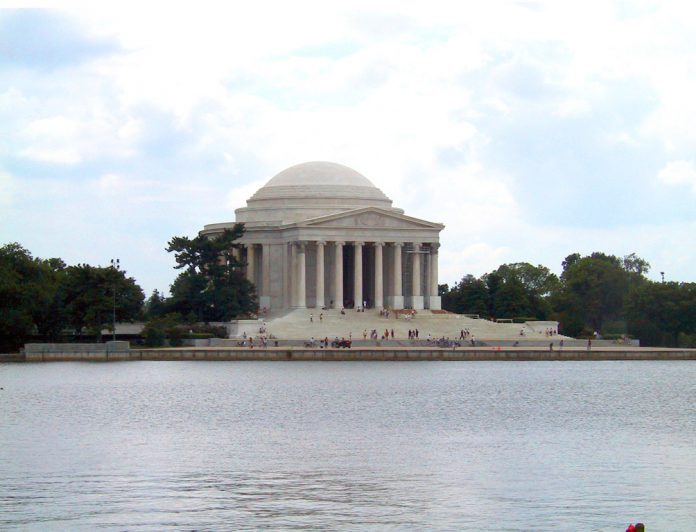
By Emily Green
Some fear the Trump Presidency may benefit his private assets over the public good but when it comes to his water policy, Trump Organization hotels would not escape impacts.
Let’s assume it is 2019, and two Trump proposals–to reduce the reach of the Clean Water Act and slash funding for federal water-related programmes–have been adopted.
A guest checks in at the Trump International Hotel in Washington DC, a few blocks from the White House, then goes for a round of golf at the Trump National Golf Course in Virginia. As it rains, the downpour cascades off the grass into the Potomac River, carrying with it recently applied pesticides and turf builders. In years past, 465 mature elm, green ash, and black locust trees used to clean the runoff like “nature’s Brita filters” as Potomac Conservancy President Hedrick Belin once put it.
This is exactly the kind of buffer that the Chesapeake Bay Program once encouraged to prevent eutrophication. But more than a decade after club owner Trump removed the trees, most likely to improve the view, by 2019, President Trump’s water policies will have radically compounded pesticide and nutrient loading of the Potomac. The striking down of the clean water rule regulating ephemeral streams and zeroing out federal incentives to plant tree buffers will have impacted not just a short run along a golf course but all of the river’s branches across three states.
Downriver from Trump National Golf Course, the muddy froth that by 2019 now makes up the Potomac River reaches intakes of DC Water, the utility serving Washington DC. Contaminants that one president sought to lock up in buffer zones are now, under Trump, rushing towards the drinking water supply of the nation’s capital.
It is the job of George Hawkins, General Manager of DC Water, to clean up Potomac flows used by the utility. “It is much more expensive to try to remove contaminants once they are in the water, rather than eliminating exposure from the source,” he explains. Under the Obama-era rules, polluters were guided with both carrots and sticks–laws and mitigation grants–to clean up that water. Under Trump, polluters are let off the hook. The burden has shifted entirely to end users, including the guests at the Old Post Office.

Washington DC guests aren’t the only chumps in a 2019 post-slash and burn scenario. Take Trump International Hotel & Tower, perched on the Chicago River blocks from Lake Michigan, where the President eliminated all funds for the Great Lakes Restoration Initiative. In the past, the programme brought Lake Erie back from the dead, reduced invasive species such as the sea lamprey, cleaned up toxic sites, restored buffer zones to cleanse inflows, and modernised shipping locks. Now it has been, according to the White House euphemism, “returned to the community.”
Trump’s budget asserted that leaving the Great Lakes to state and local entities allowed the federal Environmental Protection Agency to “focus on its highest national priorities”. It’s hard to imagine a higher national priority than the largest freshwater system in the world, set in a region home to more than 30 million people.
Rather, a more likely underlying rationale for eliminating federal support of Great Lakes restoration may be found in an eerily similar budget to Trump’s, this one published by the Heritage Foundation, whose directors include influential Trump supporter Rebekah Mercer. In recommending the same sweeping Great Lakes cuts, the foundation asserted: “States, not the federal government, should manage bodies of water that fall within their boundaries (lakes, rivers, streams). State management would increase accountability, transparency, and efficiency.”
Unfortunately, said Lindsay Chadderton, the Nature Conservancy’s aquatic invasive species director, leaving invasive species control to individual states on a lake system bordered by eight states and two countries renders security only as strong as the weakest state in the link. If one or more local authority fails to coordinate control, he said: “It’s like locking the back door but leaving the windows and front door wide open.”

What do Asian carp and other invasive species matter to a Trump hotel guest? Carp, which reach from 50 to 100 pounds, leap when spooked. Anglers have reported broken noses and ribs after being hit by a fish the weight of a standard poodle. Or imagine going to a restaurant where the seafood choice is Asian carp, Asian carp or Asian carp. The lake’s famous trout, whitefish, chum and herring could all be all dim memories, as could easily be the Great Lakes’ once mighty US$7 billion annual fishery. A hotel guest’s bath would be even more expensive, thanks to the high costs of unclogging the water company’s Lake Michigan intakes from exotic quagga mussel infestation.
No city, no Trump hotel will be immune from the potential impact of proposed cuts. Lurid brown sugar cane drainage could routinely be flushed out of Lake Okeechobe into the turquoise waters off Mar-a-Lago at the height of the spring season. The visibility around Trump International Las Vegas could routinely drop to zero thanks to drought-fueled dust storms. A Zika virus outbreak could lead to summer shutdowns of the Trump Winery in Charlottesville.
To be sure, the White House may yet put down its scissors. In fairness, Trump is not the first president to face a steep learning curve about water’s complex budget needs. Obama once argued against the need for two agencies to supervise salmon, until someone pointed out just how far afield salmon go. “We have to understand our hydrologic systems to make good decisions,” says Helen Taylor, Director of the Nature Conservancy office in Lansing, Michigan. “We’re trying to be science-driven and practical. I am optimistic that those conversations will emerge.”
Karl Blankenship, Editor of the Chesapeake Bay Journal, underscored why restoration of the country’s largest estuary, needs federal oversight. “If someone’s not empowered to coordinate everyone, the lesson of the past is things don’t happen,” he says. “People historically don’t clean up things for the sake of their neighbours. Ohio didn’t reduce air pollution for Pennsylvania’s sake and Pennsylvania’s not going to reduce water pollution for Maryland’s sake. Those are tough issues and it takes someone to be in charge.”
Western waters further reinforce that point. Years ago, Arizona Congressman Morris Udall and his brother Secretary of the Interior Stuart Udall were instrumental in a fight over Colorado River water that reached the Supreme Court. Now their son and nephew, Bradley Udall, argues that federal, not state, government is needed to oversee interstate waterways. “Solutions need to be local but you need the feds saying, ‘Here’s the Federal law, please act so that we don’t have to’,” he says.
Udall, a senior water and climate change scientist at Colorado State University, worries that Trump’s anti-science stance is taking water management in a dangerous direction. “One of the lessons from Texas,” he adds, “was one couldn’t talk about climate change, but one could talk about ‘long-term drought.’ It may be soon that some agencies can’t talk about climate change but can talk about, say, ‘reduction in supplies.’”
So, guests in a Trump hotel, admonished for long showers due to a “reduction in supplies,” will know the real reason. It all could still be prevented. But only if the White House traces its own bathwaters to the source, and realises that deregulation of federal laws and de-funding of federal programmes simply forces each private hotel guest to pay the polluter of a public resource shared by all.








